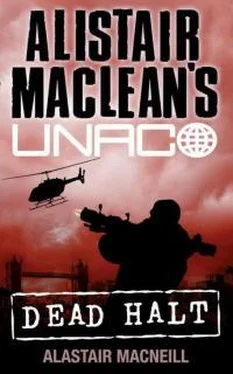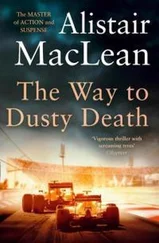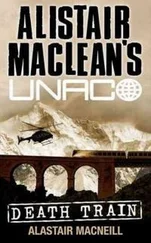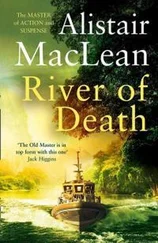The telephone rang and Palmer rose quickly to his feet to answer it.
“Good evening, Commander. It’s Sergei Kolchinsky. Can we talk?”
“Not on this line. I’ll transfer the call to my scrambler line.” Palmer pressed a button on the telephone, replaced the handset, then went through to the study and picked up the receiver on his desk. “We can talk now, Mr. Kolchinsky.”
“Good.”
“I’ve been expecting your call ever since I received the report on what happened in Switzerland earlier tonight.”
“So you’ve been fully briefed?” Kolchinsky asked.
“Yes, Keith Eastman called me twenty minutes ago.”
“Then you’ll know that one of my operatives was injured in the fiasco,” Kolchinsky said angrily.
“Keith told me. How is she?”
“She needed seven stitches to a gash on her neck. She’s being kept in hospital overnight for observation. She was lucky by all accounts. The doctor treating her said that had the projectile struck her on the head and not on her neck, it could have been fatal.”
“I’m just glad she’s all right.”
“Michael Graham was absolutely livid when he phoned his report through to me earlier this evening. And he has every right to be. This is now the third time that the IRA have been quicker to the draw than us. In the first two instances there was an element of doubt over the IRA’s source of information. It’s possible that Graham could have been overheard talking to Roche in the bar. And they could have fled the boarding house after seeing the pictures of Mullen and Kerrigan on the front page of the morning newspaper. But after tonight, it all falls into place. You have a mole in your organization, Commander. And it’s either Keith Eastman or John Marsh.”
“Or one of your operatives,” Palmer shot back.
“Michael and Sabrina were only given the address of the chalet once they touched down in Zurich,” Kolchinsky was quick to reply. “And as Michael pointed out, all they needed to know in London was that McGuire was in Switzerland. The chalet’s exact location wouldn’t have meant anything to them. Only Eastman and Marsh knew the address from the very beginning. And before they left for Heathrow Airport either Eastman or Marsh had already made the call claiming that there was a bomb on board the Airbus, giving the IRA cell time to catch another flight to Switzerland ahead of them. Which puts Michael and Sabrina in the clear.”
“Keith and John are two of my most trusted men. That’s why I assigned them to the case. I still believe the IRA obtained the address of the chalet from a source outside this organization.”
“Be that as it may, Commander, Jack Scoby arrives in London tomorrow afternoon. We’ve already lost McGuire, heaven help us if anything should happen to Scoby.”
“I’m still very skeptical about this theory of yours, Mr. Kolchinsky. I mean, what would the IRA have to gain by killing him? My God, it would be tantamount to suicide. The American public would turn against them in their droves and that would seriously affect the financial support they receive from the States.”
“We can’t afford to be complacent, Commander. If Scoby is killed over there and it comes out later that both UNACO and the anti-terrorist squad had been forewarned of a possible attempt on his life and hadn’t taken the necessary steps to protect him, then heads will roll. Starting with ours.”
“I may be skeptical but I’m still taking it seriously, Mr. Kolchinsky. Very seriously.” Palmer exhaled deeply and raked his fingers through his hair. “I’ll have their offices and homes searched before they return from Switzerland tomorrow. Not that I expect to find anything. But rest assured I’ll call you if we do come up with something.”
“I’d appreciate that.”
“Good night, Mr. Kolchinsky.”
“Good night.”
Palmer replaced the receiver then sat back in his chair and chewed his lip pensively as he pondered the best way to initiate the investigation. He decided against using any of his own men. That could be misconstrued as biased, especially if nothing was found to incriminate either man, which he was certain would be the case. He would bring in outside help; another department. The Special Branch. He had been in charge there before taking over at the anti-terrorist squad. The head of Special Branch was an old friend. And the men there still held him in high esteem. He knew he could count on them being impartial and, above all, discreet. He would have to clear it first with the Commissioner. But he saw that as little more than a formality. Obtaining search warrants would be a far more difficult task. Especially at that time of night. But he was determined to play it by the book. In the unlikely event of something being found that could link one of them to the IRA, it was imperative that the paperwork should be in order.
He had a feeling that he had a very long night ahead of him.
The Scobys lived in a two-story mansion on Long Island. It was surrounded by a ten-foot wall and guarded twenty-four hours a day by armed security men. One of the guards approached Whitlock’s white BMW as he brought it to a halt in front of a pair of towering wrought-iron gates. A closed-circuit television camera, mounted on top of the wall, slowly panned the car while a security guard inside the house fed the BMW’s registration number into a computer to check its ownership.
“Good evening,” the guard said with a quick smile as he peered into the car. He looked from Whitlock to Paluzzi, who was in the passenger seat, then back to Whitlock. “Can I help you folks?”
“C.W. Whitlock. We have an appointment with Mr. Scoby at eight o’clock.”
The guard checked both men’s identity cards then handed them back. He unclipped a two-way radio from his belt and spoke into it. Moments later the gates were opened from inside the house. “Follow the road. It’ll take you right into the courtyard.”
Whitlock thanked him and drove into the grounds as the gates closed behind them. He kept to the driveway, which continued for another two hundred yards, until he reached the gravel courtyard.
A somber-looking butler was waiting for them in front of the house. “If you give me the keys, sir, I’ll have the car parked in one of the garages for you.”
Whitlock handed the keys to the butler who led them up the steps and into the house. The hall was lined with portraits of previous American Presidents. But as Whitlock cast his eyes over the gallery of faces he suddenly realized that all the pictures were of Republican Presidents. There wasn’t a Democrat amongst them. He smiled to himself. It was typical of an outspoken right-wing Republican politician to hold all Democrats in contempt. Especially the Presidents …
The butler led them into a small lounge. “If you’d care to wait here, someone will be along shortly.”
Whitlock picked up a copy of Time magazine from the coffee table and sat down in the nearest armchair. Paluzzi crossed to the window and looked out over the spacious lawn which led down to a diamond-shaped swimming pool. Although illuminated by a powerful overhead floodlight, the pool was empty. The tennis court beside it was in darkness.
“He must have a bit of money behind him to afford something like this,” Paluzzi said at length.
Whitlock looked up and nodded. “Don’t forget that he was one of the most successful lawyers in New York before he decided to run for the senate.”
“His father was a judge, wasn’t he?”
“Yes, Judge Arthur H. Scoby. Another outspoken Republican. He died last year.”
The doors swung open and Ray Tillman entered the room. He shook hands with Whitlock who then introduced him to Paluzzi.
“The senator’s not back yet, I’m afraid,” Tillman told them. “He rang about an hour ago to say he’d be late. He asked me to apologize to you for not being here to meet you in person. He’s stuck in a meeting with some of the city’s leading financiers at a hotel over on Fifth Avenue. It’s always the same when a new senator gets elected. The financiers want to test the water, see what kind of deals they can get out of him. But knowing Jack, they’ll be coming out empty-handed tonight. They’ve leeched off the Democrats for too long. I’m sorry, you’re not Democrats are you?”
Читать дальше











